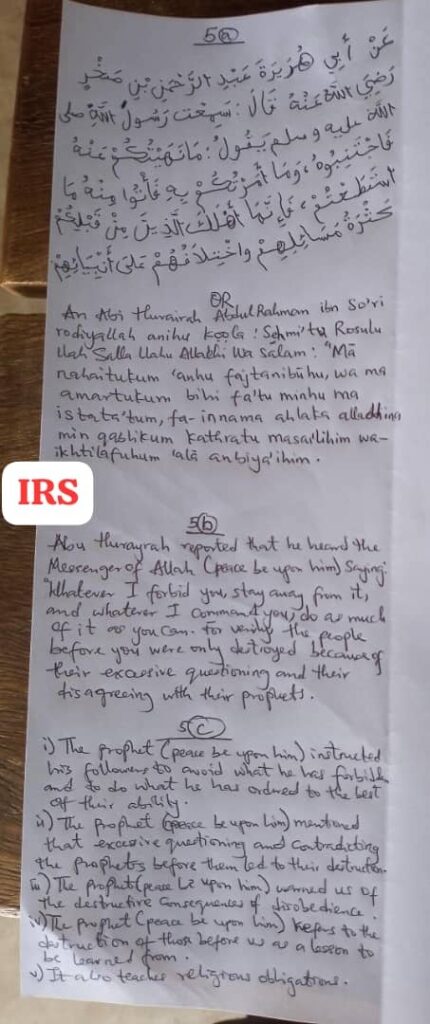WAEC Islamic Studies OBJ 2025
01-10: DBCBADACAA
11-20: BBDBAACBDC
21-30: BCABCCAABC
31-40: DDCDCCCABC
41-50: ADBBCABCDD
WAEC Islamic Studies Essay 2025
Number 1
(1a)
Jahiliyyah literally means ignorance.
Technically, Jahiliyyah refers to the period of ignorance or the dark age in Arabia before the coming of Islam. It was a time when people had no divine guidance. They worshipped idols, practiced immorality, buried their female children alive, and lived in tribal conflicts and injustice. This period ended with the arrival of Prophet Muhammad (SAW) and the revelation of the Qur’an, which brought light and guidance.
(1b)
(PICK FOUR ONLY)
(i) Naa’ilah
(ii) Hubal
(iii) Al-‘Uzza
(iv) Isaaf
(v) Manat
(vi) Al-Lat
(1c)
(i) Polytheism to Monotheism; Before Islam, Arabs worshipped many gods and idols. Islam introduced the belief in one God, Allah, ending idol worship. This shift united the Arabs under a single faith and emphasized worship of only Allah, bringing spiritual and social unity.
(ii) Improvement in Women’s Status; Islam ended many harsh practices against women, such as burying female babies alive. It gave women rights to inherit property, receive dowries, and have a say in marriage. This improved their social and economic status significantly.
(iii) Ending Social Corruption; Islam prohibited common corrupt practices like drinking alcohol, gambling, and adultery, which were widespread in Jahiliyyah society. This helped promote a healthier and more ethical community life.
(iv) Establishing Justice (Al-‘Adl); Islam emphasized fairness and honesty, replacing cheating and oppression. It particularly protected vulnerable groups like orphans and the poor, ensuring their rights were respected in society.
(v) Ending Tribalism and Promoting Equality; Before Islam, Arabs were divided into tribes with fierce loyalty, often leading to conflict. Islam taught that no tribe or race is superior to another, promoting unity and brotherhood among all people.
(vi) Moral Reformation; Islam encouraged good morals such as truthfulness, kindness, humility, respect for parents, and fulfilling promises. This helped correct the moral decline and ignorance (Jahiliyyah) of the pre-Islamic period.
==================
Number 2
(2a)
Bismillahi Rahmanir Rahim
(i) Iza ja’a nasrullahi wal-fath
(ii) Wa ra’ayta an-nasa yadkhuloona fi dini Allahi afwaja
(iii) Fasabbih bihamdi Rabbika wastaghfirhu innahu kana tawwaba
(2b)
In the name of Allah, the Beneficent, the Merciful
(i) When Allah’s help and victory come,
(ii) And you see people entering Allah’s religion (Islam) in crowds,
(iii) So glorify the praises of your Lord, and seek His forgiveness. Certainly, He is ever ready to forgive.
(2c)
(i) The Surah teaches that Allah (SWT) promises to help His followers over their enemies.
(ii) It also teaches that Allah (SWT) protects His religion and those who work for the propagation of Islam.
(iii) It teaches that Allah (SWT) fulfills His promise to His servants, but often tests their faith first. Man should not expect immediate success, but should do his duty and have full confidence in Allah (SWT).
(iv) It teaches that help and victory from Allah (SWT) come only after effort and struggle.
(v) The Surah teaches us to seek forgiveness from Allah (SWT), for He is always ready to forgive.
(vi) The Surah reminds Muslims to remain humble and spiritually alert, even at the peak of success and achievement.
==================
Number 3
(3a)
Imān is the Islamic term for faith or belief, specifically the firm belief in the heart, affirmation by the tongue, and actions by the limbs in the core tenets of Islam.
(3b)
(i) Belief in Allah
(ii) Belief in His Angels
(iii) Belief in His Books
(iv) Belief in His Messengers
(v) Belief in the Last Day
(vi) Belief in Divine Decree (Qadar), both good and bad
(3c)
(i) It teaches that everything happens by Allah’s will and knowledge.
(ii) It builds trust in Allah’s plan, even during hardship.
Advertisements
(iii) It encourages patience during trials and gratitude during ease.
(iv) It reminds believers that success and failure are part of divine wisdom.
(v) It promotes reliance on Allah rather than solely on personal effort.
(vi) It reduces anxiety over the future by affirming divine control.
(vii) It strengthens acceptance of life’s events without resentment.
(viii) It nurtures humility, knowing that humans do not control outcomes.
==================
Number 4
(4a)
Marriage (Nikah) is a legally binding contract between a man and a woman signifying their union for life. It is a contract which is valid with mutual consent, capacity to enter the contract and witnesses present.
(4bi)
(i) Providing for his wife: A responsible man must provide for his wife so as to make her comfortable.
(ii) Emotional Support: He should provide emotional support during challenging times, especially during pregnancy.
(iii) Moral Guidance: The husband is encouraged to guide his wife towards virtuous behavior and away from harmful acts.
(iv) Kindness and Compassion: He should treat his wife with compassion and understanding, avoiding insults and humiliation.
(v) Maintaining the Marital Bond: He should actively work to strengthen the marital bond through physical intimacy and constant communication.
(vi) Maintenance (Nafaqah): The husband is obligated to provide for his wife’s basic needs, including food, clothing, shelter, and medical expenses.
(4bii)
(i) Maintaining the Home: Managing the household affairs and ensuring a clean environment.
(ii) Raising Children: Taking primary responsibility for the upbringing and moral education of their children.
(iii) Obedience and Respect: Showing respect and obedience to her husband.
(iv) Responding to his Marital needs: Fulfilling her husband’s sexual rights within the bounds of Islamic law.
(v) Protecting his Property: Her properties are to be protected even if he is not around.
==================
Number 5

Number 6
(6a)
(i)Usman dan Fodio (1754–1817): A key figure in the Sokoto Caliphate, known for his scholarship and reformist movements.
(ii)Abdullahi dan Fodio (1766–1828): Brother of Usman dan Fodio, he was a scholar and played a significant role in the establishment of the Sokoto Caliphate.
(iii)Muhammad Bello (1781–1837): Son of Usman dan Fodio, he was a scholar and leader who contributed to the intellectual and administrative development of the Sokoto Caliphate.
(iv)Ahmadu Baba al-Timbukti (1556–1627 is more accurate for his lifespan, but considering the influence and potential overlap in scholarly networks): Though slightly before the 18th century, his influence might have extended.
(6b)
(i)Promotion of Literacy: Islam emphasized the importance of reading and writing, leading to increased literacy rates among West Africans.
(ii)Development of Islamic Scholarship: Islam led to the development of scholarship in various fields, including theology, jurisprudence, and Arabic language studies.
(iii)Establishment of Educational Institutions: Islamic schools and universities were established, providing centers for learning and intellectual development.
(iv)Advancement of Literature: Islamic literature flourished, with works in Arabic and local languages, contributing to the region’s literary heritage.
(v)Influence on Local Languages: Islam influenced the development of local languages, with many adopting Arabic script and incorporating Arabic vocabulary.
(vi)Fostering of Intellectual Networks: Islam facilitated the creation of intellectual networks across West Africa and beyond, connecting scholars and promoting the exchange of ideas.
(vii)Development of Legal and Judicial Systems: Islamic law (Sharia) influenced the development of legal and judicial systems in many West African societies, providing a framework for governance and dispute resolution.



Leave a comment